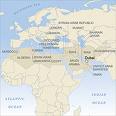Dr. Tal Pavel is an expert in Middle Eastern and Islamic World usage of the internet. He holds a Ph.D. in Middle Eastern Studies from Bar Ilan University. His thesis examined the governmental restrictions and changes concerning internet usage in Syria, Egypt, Saudi Arabia and the United Arab Emirates between the years 2002 and 2005.
Dr. Pavel’s background also includes an in-depth knowledge of Information Systems Development. He occupied various key positions as a Software Project Manager and Software Systems Analyst in various major financial and other business institutions in Israel.
Dr. Pavel is a fellow researcher at the Moshe Dayan Center for Middle Eastern and African Studies and at Netvision Institute for Internet Studies (Both in Tel Aviv University).
http://www.middleeast-internet-monitor.com
Latest posts by Tal Pavel
Skype has launched its Middle East headquarters
On June 28, 2010 Skype announced on its blog the opening of the company's first headquarters in the Middle East and Africa which will be located in Manama, Bahrain's capital. Rouzbeh Pasha, Business Development Manager for the Middle East region, will lead the company's operations in the region. The announcement...
Blocking of Wikipedia reported in Iran
According to news published in English and Persian on July 25, the Wikipedia free encyclopedia website was blocked in Iran and could not be accessed. Users tryng to acess the website are having this blockpage stating “By refering to the law concerning computer related misdeeds (crimes) access to this site...
Web filtering In the Middle East using Bing Microsoft's search engine
Research conducted earlier this year examined the extent of Internet filtering in Arab countries made using Bing search engine of Microsoft for terms with a sexual orientation. Bing search engine is active in 41 languages and it offers a Web filtering system based on keywords entered into the system in...
For the first time in Israel – blocking Internet gambling websites
On July 2010 an article was published which received no proper attention so far – for the first time the Israeli police ordered Internet Service providers to block access to websites. The news was posted on ‘Haaretz’ websites in Hebrew and English as well as on ‘Globes‘, but without significant...
Israel – Another step in government restrictions on the Web
Two weeks ago, when police directive was published for the first time in Israel, instructing the Internet providers to block access to some gambling websites, the economic Committee of the Knesset (Israeli parliament) approved, on July 13th, a bill requiring Internet service providers to inform their clients about the dangers...
The Second Decade of Middle East Internet
In its second decade in the Middle East, the Internet has been increasingly challenging many of the region's governments – specifically dictatorships that impose strict limitations on civil freedoms. It has brought about the formation of pressure groups for social and political change on FaceBook, allowed for real-time coverage of...
The Metaverse in the Arab World
Virtual worlds are becoming more complex and more intertwined with the actual world. Hence, their influence on real matters is increasing. I am speaking about the programs and games in which users, represented by avatars of their choice, can create 3D environments and virtually forge any imaginable object in them....
The Internet in post-Saddam Iraq
The status of the Internet in Iraq, regarding both governmental policies and usage, underwent a fundamental change following Saddam Husayn’s deposal in 2003. Still, as is true with so many other features of Iraqi life, Iraq does not constitute a single, homogenous unit with regard to the Internet. Along with...
On-line Social Networks in Syria
Syria was among the last countries in the Middle East to introduce the Internet. On February 24, 1996, the Syrian Telecommunications Establishment (STE) received permission from the prime minister’s office to do so, and to serve as the body responsible for the Country Top-Level Domain Code (sy.). Two weeks later,...
The Power of 140 Characters: Twitter in the Middle East
The massive, sustained protests in Iran this past month against the regime’s apparent falsification of the presidential election results was enabled by widespread employment of new communication technologies. Among them is Twitter, the micro-blog which enables its users to distribute short messages of no more than 140 characters (‘Tweets’) via...
Once again, Syria bans Facebook
Editor's Note: Facebook has been blocked in Syria consistently for the past two years; therefore, the statement that a ban will be “reintroduced” is incorrect. The linked article from ‘Al Quds Al Arabi’,” which has since been removed, did not actually claim that Syria planned to reintroduce a ban. The...
The Other Voice: Women in the Cyberspace Discourse in the Middle East and Islamic World
http://www.dayan.org/Women%20and%20the%20internet.pdf Tel Aviv Notes, Dayan Center, Tel Aviv University – 30 August 2009. In recent years, the Internet has become a swift and accessible means of communication, thanks in part to the proliferation of personal blogs and, even more recently, micro-blogs (through “Twitter”). Users are now able to transmit short...
Liberia government sites are off, and nobody cares
On the night of August 24th. S.W.A.T hackers (probably Iranian team) penetrated 19 governmental web sites including almost all ministries. Most of the sites were down for maintenance for almost three days. Almost all government sites in Liberia fell for days. But when gargbage covers the streets of the capital...
France: ‘3 Strikes’ Internet piracy law defeated in parliament
France's parliament rejected Hadopi (la Haute Autorité pour la diffusion des œuvres et la protection des droits sur internet) bill on Thursday (09.04.2009) with the ruling UMP party failure (21-15) to approve the law. The law proposed two warnings and then, after a third violation, disconnection from the Internet for...
Prologue
My name is Tal and I'm proud to join GVA authors’ team. I intend to write about online free speech in Israel as well as Internet Filtering in the MENA and other current issues.









